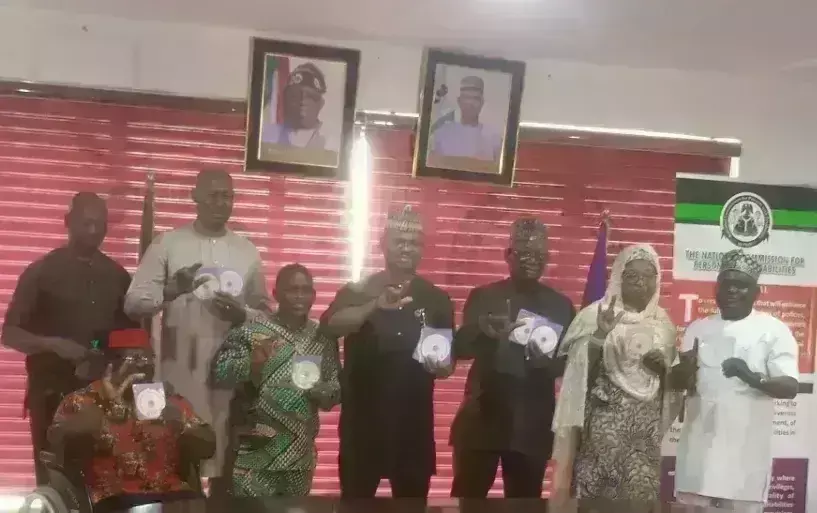Translating disability law into sign, local languages excites Tinubu’s aide
According to him, the initiative is to enable relevant stakeholders within the disability community understand the relevant provisions of the law and defend their rights as citizens of Nigeria.;

Group photograph during the unveiling on Tuesday in Abuja
Malam Mohammed Isa, Senior Special Assistant to President Bola Tinubu on Special Needs and Equal Opportunities, has lauded the translation of the disability laws into sign and local languages.
Isa gave the commendation on Tuesday in Abuja at the unveiling of the simplified version of the Discrimination Against Persons With Disabilities (Prohibition) Act in sign language and an audio version in Hausa, Yoruba, and Igbo.
Supreme News reports that the launch of the law was put together by The Leprosy Mission (TLM), Nigeria, in collaboration with the National Commission for Persons with Disabilities (NCPWD).
“Today further demonstrates the passion, dedication, and commitment of this administration to support every initiative and intervention that promotes the inclusion and participation of persons with disabilities and special needs.
“President Tinubu believes that nobody should be left behind in the scheme of things, regardless of individual abilities.
“The launch is a crucial step in enhancing awareness and understanding of this landmark legislation within our rural communities.
“I extend my deepest gratitude to TLM for its unwavering commitment and tireless efforts towards making this vision a reality.
“The initiative to translate the Disability Act into Hausa, Igbo, and Yoruba and to produce these translations in audio format for our visually impaired brothers and sisters, as well as into sign language for our deaf community, is both commendable and transformative,” Isa said.
NAN reports that Isa was represented by the Director of Media and Publicity in his office, Mr. Lanre Oloyede.
Also speaking, the Executive Secretary of NCPWD, Mr. James Lalu, commended TLM and the CEO of Qualitative Magazine, Mr. Chris Agbo, for their efforts in making the translated disability law a reality.
According to him, the initiative is to enable relevant stakeholders within the disability community to understand the relevant provisions of the law and defend their rights as citizens of Nigeria.
“I am a beneficiary of this law in sign language; producing this version into sign language is one of the important steps towards bringing the content of the law to the deaf community.
“One of the gaps we realise is the necessary awareness creation for the disability community to understand their own rights and dignity as contained in the law.
“It is when you understand your right that you can demand it.
“I want to thank President Tinubu for his support in ensuring that the NCPWD delivers on its mandate.
“We’re empowered by Section 38 of the disability law, and, on that, we are committed to protecting the rights of PWDs as we work with security and other relevant agencies,” Lalu said.
Similarly, the National Coordinator of LMN, Dr. Samuel Udoh, represented by the Head of Programmes, Mr. Pius Sunday, said the mission would continue to ensure that no one is left behind.
“This unveiling is a testament to our commitment to ensuring that every Nigerian, regardless of his or her abilities, has access to justice, equality and dignity.
“By translating this law into our local languages, we are making it accessible to all Nigerians. This inclusivity ensures that everyone, regardless of literacy level or language spoken, can
understand his or her rights as enshrined in the law.
“It challenges stereotypes and breaks down the societal barriers that have long excluded people with disabilities from achieving their full potentials.
“We must remain vigilant and proactive in ensuring that the rights enshrined in this law are realised in every corner of our nation,” Udoh said.
Meanwhile, the consultant and CEO of Qualitative Magazine, Chris Agbo, who drove the process, has said that the aim was to make the law accessible to enable PWDs to seek out their rights.
‘I want to believe that the NCPWD will take it upon itself to spread and distribute these versions. I also call on the orientation agency to play its role here.
“I urge the media to create awareness for PWDs so that there will be space for them in the scheme of affairs in the country,” Agbo said.

